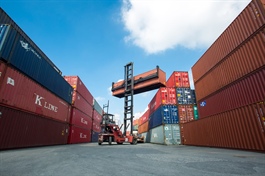Viet Nam’s exports to hit US$618 billion by 2030 at 7 per cent annual growth
Viet Nam’s exports to hit US$618 billion by 2030 at 7 per cent annual growth
Viet Nam will be a key driver of global trade growth, with its exports projected to reach US$618 billion by 2030, an annual growth rate of 7 per cent, outpacing the global average of 5 per cent by a significant 2 percentage points.

This information was released in the Future of Trade: New opportunities in high-growth corridors research report by Standard Chartered. The report projects that global trade is set to reach $32.6 trillion with a growth rate of 5 per cent by 2030.
Trade corridors anchored in Asia, Africa and the Middle East will outpace global trade growth rate by up to four percentage points, driving combined trade volume in these regions to $14.4 trillion to account for 44 per cent of global trade by 2030.
Mainland China, South Korea and the US are expected to be Viet Nam’s key trade partners in the coming years. Meanwhile, trade with India, Singapore and Indonesia is forecast to experience robust growth from 2021-30.
Growing global demand for electronics, investments and sustainability initiatives will drive Viet Nam’s key exports.
Michele Wee, CEO of Standard Chartered Vietnam, said: “Viet Nam holds tremendous potential to be a global trading hub. As an international bank with 119 years operating in Viet Nam, we are uniquely positioned to facilitate cross-border transactions and support our clients in navigating the complexities of the market and seizing global trade opportunities.”
The research included a survey of more than 100 global business leaders in 13 markets who shared the following as their top challenges including rising geopolitical conflicts and tensions (54 per cent), high and volatile energy and commodity prices (52 per cent), poor infrastructure quality (46 per cent), high inflation (45 per cent), sanctions, tariffs and export bans (44 per cent).
By 2030, increased adoption of digital supply chain finance solutions could drive up exports by 7.5 per cent in the 13 surveyed markets, an uplift of $791 billion. Digital supply chain finance solutions can also help drive greater financial inclusion and participation for small and medium-sized enterprises (SMEs), help companies track adherence to ESG criteria and reduce the risk of fraud and cost of monitoring.
Michael Spiegel, Global Head, Transaction Banking, Standard Chartered, said: “Global trade is set to drive the next decade of growth. We aim to help our clients improve access to finance and achieve ESG compliance across their entire supply chains. Digital supply chain finance solutions will play a game-changing role in achieving these goals and enable sustainable trade growth across developing economies.”





















